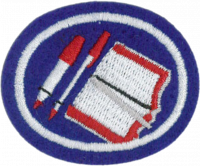AY Honors/Bible Marking/Answer Key
1
1a
1b
1c
Questions a, b and c are answered together below.
| Chain Reference | |
|---|---|
| Description: In this method, you first choose a topic and come up with a very short key for it. For instance, "Salvation by Grace" might become "SbG" or even "SG". Then you find a blank page either near the front or near the back of your Bible and write the title, the key, and the first reference, such as Col 2:14. You then turn to that reference in the Bible, and in the margin near the first reference, you write the key plus the reference to the next verse. Continue doing this until you annotate the final verse with the key and the letter "F" (for "final"). | |
Advantages:
|
Disdvantages:
|
| Comments: | |
| Color Code | |
|---|---|
| Description: Choose a color for the topic. As you read your Bible, when you come across a passage having to do with that topic, you mark a line down the margin starting where that topic begins, and ending where the topic ends. If the passage has a subheading and the entire passage has to do with the topic, underline the subheading with that color. | |
Advantages:
|
Disdvantages:
|
| Comments: | |
| Cross Reference | |
|---|---|
| Description: 1. Where you have found two or more texts speaking about the same subject you can, alongside one of these texts, in the margin, write the reference to those other texts. Then go to those other texts and write the reference of the first text. 2. If it is to do with only a word or a phrase from the text that you wish to support from other texts, then place an "R" alongside that word or phrase. | |
Advantages:
|
Disdvantages:
|
| Comments:
| |
| Highlighting or Underlining | |
|---|---|
Description:
| |
Advantages:
|
Disdvantages:
|
| Comments: | |
| Number Reference | |
|---|---|
Description:
| |
Advantages:
|
Disdvantages:
|
| Comments: | |
| Subject Lists | |
|---|---|
Description:
| |
Advantages:
|
Disdvantages:
|
| Comments: | |
2
- Choose a Bible that suits your needs. If you will need wide margins to write in the cross reference system OR if you need space to write notes for the number system, choose a Bible with wide margins.
- Choose a method that suits your needs.It generally better to use only one method of marking in a Bible. If you wish to try another method, use a different Bible.
- Choose a marker that will not bleed through the page. If in doubt, make a small test mark before you begin, and make sure it does not show through on the other side of the page.
- Do not overmark your Bible. Too many marks make it almost unreadable, so keep it simple.
- Do not use too many colors, but when using multiple colors, make sure they are distinct.
- Plan before you start, and have a definite aim in marking the Bible.
- Don't mark an heirloom Bible. For instance, Gramma Tillie's Bible with her ancestry recorded within is not an appropriate choice for marking. Get a new Bible if you need to. Thrift stores that accept books often have many (sadly) barely used Bibles for sale, and many churches buy Bibles in bulk for evangelism series, or have a collection of Bibles to give away. Do not let cost prevent you from completing this honor.
- If there are not enough blank sheets at the end of your Bible, you can carefully add more by gluing them in. Cut the paper to size, and use a little glue along its edge. Then slide the glued edge as far back into the spine as you can.
- Choose a translation you will enjoy reading and find easy to understand. This will make the process much more enjoyable.
3
3a
3b
These methods are good for sharing the Bible with another person:
- Chain Reference
- Subject Lists
4
4a
4b
These methods are good for personal study
- Chain Reference
- Color Coding
- Cross Reference
- Subject Lists
Notes
The Stewardship honor starts out with a nice Bible study.
References
- South Pacific Division notes on teaching this honor
- Trainer Notes for this honour from the South Pacific Division. (You will need a username to access this document.)


